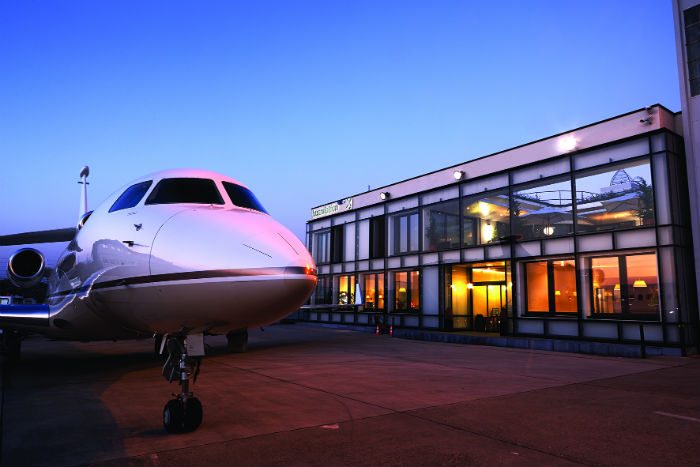Luxaviation’s Patrick Hansen on helping smaller operators and mistakes

Luxaviation Paris FBO
Buying a company is easy. Integrating it is not. Luxaviation came into being in 2010 when Patrick Hansen, a financier and the group’s chairman and CEO, acquired a Luxembourg operator. After eight years and more than 10 acquisitions later it is now one of the largest business jet companies in the world. But Hansen says he is just starting.
Corporate Jet Investor: In the Patrick Hansen Luxaviation Project, where are we now?
Patrick Hansen: Halfway there.
Corporate Jet Investor: What is the end point?
Patrick Hansen: We want to have more than 500 aircraft under management, more than €1bn turnover and be the employer of choice in the industry.
Corporate Jet Investor: Have you got the same capital available now as you had three years ago?
Patrick Hansen: The capital is not the problem in the current economic environment. It comes down to what you get, at what price and what you can do with it afterwards. Just because I can buy something really cheaply in one country doesn’t mean that it’s a good purchase. If I buy something really expensive, maybe in Australia, it might be a good purchase. These are the judgements that we have to make and, basically, sometimes you have to say, “I am not participating.”
Corporate Jet Investor: But to get to your target, do you need to keep acquiring?
Patrick Hansen: Absolutely. If you want to achieve where we want to be, we cannot do this organically as much as I’d love to. We have to go for acquisitions and I’d rather go for bigger ones than smaller ones for the obvious reasons. But I cannot pay prices that are too expensive.
Corporate Jet Investor: Are there any big targets still out there?
Patrick Hansen: Of course there are bigger ones out there. Now you will ask me which ones, and I will not say. But there are properties with serious turnover. Not all of them are for sale and, if something is for sale, maybe it’s not the right time.
Corporate Jet Investor: Of course I do not expect you to name names.
Patrick Hansen: Yes, you do. (Laughter)
Corporate Jet Investor: I would like you to, but I do not expect names – but I am very happy if you want to. But there does seem to be a lot of people looking to sell smaller companies – with companies like you, Jet Aviation and Gama Aviation seen as obvious buyers.
Patrick Hansen: There is a serious problem and I won’t hide that from you. I think many people right now are thinking, “Oh, those guys that you mentioned, they go out and throw money around.” I see people trying to sell businesses with very low margins, with low-grade futures, asking unreasonable prices with wild expectations because they think somebody will come around and scoop them up. That’s just not going to happen.
Corporate Jet Investor: Do you think the market is getting better for business aviation?
Patrick Hansen: No.
Corporate Jet Investor: Really?
Patrick Hansen: A lot of the market is terrible. There are structural problems. There are so many small operators out there and the regulations are becoming more and more severe. You need to keep increasing the size of your aircraft fleet in order to make money. I can’t believe when we started you needed a fleet of seven to be profitable. With a fleet of seven today, you’re still losing money unless all seven are the same type. With a mixed fleet, I think you are right now looking at somewhere between 12 and 14 aircraft that you need to have.
What do the small operators do? They are offering the cheapest pricing to new customers, which helps them to get from one month to the next, but is a structural problem in the aviation industry. Ultimately, this approach impacts on the financial stability of smaller operators which, in turn, will eventually result in a serious safety setback for the industry.
Corporate Jet Investor: When will that be?
Patrick Hansen: I hope never, because then we would be talking about lives.

Patrick Hansen, chairman, Luxaviation
“If you want to buy cheaper, buy from me.”
Corporate Jet Investor: Is there anything you can do to change this?
Patrick Hansen: We are keen to help smaller operators. We are basically saying, “Listen, a lot of the supplies that I’m buying right now, I’m buying cheaper than many other people.” If I sell someone FBO services, maybe I can also sell them other services and help them actually secure margins. That’s what we need. We need an industry with healthy margins. We cannot have an industry that is running on negative margins. Hopefully, our approach can help to stimulate growth and have a positive effect on the industry.
Corporate Jet Investor: What sort of costs are you looking at?
Patrick Hansen: : Insurance, fuel, training, every supply that goes into a plane. Most of the time I buy cheaper than anybody else just because we negotiate. I’m open for business to say to any other operator, “If you want to buy cheaper, buy from me.”
Corporate Jet Investor: Would you also look at selling charter?
Patrick Hansen: Let’s look at it differently. For smaller operators, we are very likely to be your biggest client because we have created a network in 40 countries where we have charter requests. We cannot charter them all out of our fleet so we can give the work to a sub-charter. Who do we use? Well, the local small operators.
So, if you want to do business with us, we actually give you revenue. In addition, you can also buy supplies cheaper from us. That means you can, hopefully, work toward a decent margin; you can sell at market price and you have a big client that has an aligned interest with you. That’s all we were thinking.
If you see the operator as our client, and he sees us as his potential biggest client – because for many smaller operators, we are – that’s a win-win situation that we think is very, very nice going forward. That’s when we will see who are the serious operators. We can see these guys can make margins, with a sustainable business model, and that’s how you create relationships.
Corporate Jet Investor: Would you also look to share things like IT systems? You have spent a lot on your IT, haven’t you?
Patrick Hansen: We have spent a lot on IT and we are going to spend more – that is another thing that a lot of the small operators just cannot offer. They just cannot do it. We can, so let’s spend on IT, but not just for the sake of spending on IT – to make our business smarter, to make things better connected, to better understand. We have a big data initiative to actually predict a plane is likely to fly in three weeks to a particular airport or a person is going to fly in four weeks. That’s going into more predictive analysis, which costs money. We have started to make the investment in the last two or three years.
Corporate Jet Investor: Has centralising things like charter worked?
Patrick Hansen: No.
We think there are things in centralisation that are good, but what are they? Central purchasing is one. If we can buy, centrally, all of the goods we need, that’s fine.
But if we try to say we’ll close an AOC and put the operation under centralised management, because we don’t need so many AOCs, that could be a mistake. Those local people are close to the clients, they speak to the clients, they’ve known the clients for 15 years. The business won’t work without them.
Corporate Jet Investor: You were optimistic when you bought everything that you could centralise?
Patrick Hansen: Yes, and we have made our mistakes. Everybody makes mistakes; now we have to learn not to make them again. And we’re willing to share the lessons we have learnt with the industry, so other people do not make the mistakes we have made.
Corporate Jet Investor: Are you almost looking at a franchise model?
Patrick Hansen: We have a franchise model in some countries already. We think it’s very much sustainable in the FBO industry – some people are doing that and we think it is working.
On the AOC side of the business, everything comes down to safety and procedures. It’s very, very difficult to do a franchise model because how can we really know how the business is being implemented without auditing it constantly? And if we spend so much time auditing, who pays for that cost? If you franchise something, you want money in return. A small operator might not have the money to pay and we don’t have the time or the money to develop people who can’t pay.
Corporate Jet Investor: Are you still planning an IPO?
Patrick Hansen: That’s a good question. Yes, and we are still thinking that we are on track. An IPO is not just about the day of the listing. There are a lot of internal changes, so we need to have all the staff prepared in advance.
We think we will probably do the listing in the first half of 2019. It ultimately depends on the market, and it depends on Brexit. That’s a very serious issue and an example of something we are not in charge of.
Corporate Jet Investor: You are quite well hedged, aren’t you? You have got several AOCs to move aircraft to?
Patrick Hansen: We are hedged but we’re also exposed, which is something we have to work on.
Corporate Jet Investor: I am impressed that you are willing to admit to mistakes.
Patrick Hansen: We are not worried about talking about mistakes. The guy who does not speak about mistakes is the guy who actually loses out.









